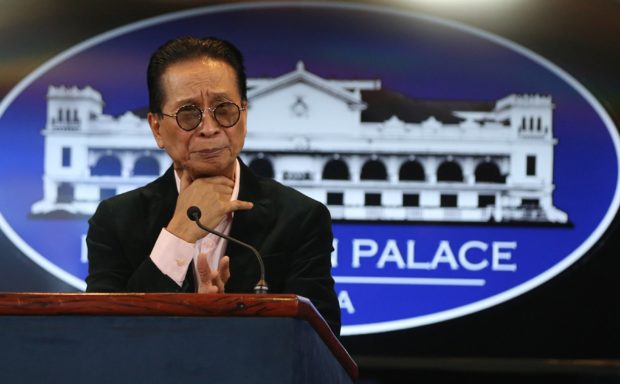MANILA, Philippines — Malacañang on Tuesday said the families of 14 farmers from Negros Oriental province whom police allegedly shot in cold blood last month should bring charges against the policemen involved, giving assurance that President Rodrigo Duterte would neither allow police brutality nor tolerate police abuse.
Fact-finding teams from 21 human rights and farmers’ organizations investigated the March 30 killings in Canlaon City and Manjuyod and Santa Catalina towns and found through interviews with witnesses and the victims’ families that the policemen who were supposed to be searching the farmers’ houses for illegal weapons summarily executed them, contrary to the police claim that they fought back.
The best they can do
The investigators also found that the policemen took money and other valuables from the farmers’ houses.
“The families should file charges, that’s the best they can do, and we will let the law take its course,” presidential spokesperson Salvador Panelo said in a text message on Tuesday.
Panelo gave assurance that President Duterte would “not allow police brutality nor will he tolerate police abuse.”
“The Palace is waiting for the official copy of the report on the investigation, which the Philippine National Police is currently doing with a team from its national headquarters now in Negros Oriental,” Panelo said.
Gen. Oscar Albayalde, the PNP chief, has said the three separate, military-backed raids were legitimate police operations, as these were backed by search warrants.
He has also said the victims were either members or sympathizers of the communist New People’s Army and that some of them had participated in attacks on security forces in Negros Oriental.
Shoot then plant evidence
The fact-finding teams, however, learned that the policemen did not allow the farmers to see the supposed search warrants.
Instead, they herded the farmers’ family members out of the house or into an adjacent room then shot the victims.
After the shootings, the family members who were inside the house were ordered out.
Then the policemen went in to “plant small-caliber firearms, ammunition, hand grenades or rifle grenades in the house,” Danilo Ramos, chair of Kilusang Magbubukid ng Pilipinas, said, reading from the investigation report at a news conference in Cebu City on Monday.
Ramos said the fact-finding teams had established a pattern in the behavior of the raiding teams in all the killings: barge into the house, show a supposed warrant, clear the house of witnesses, shoot the victims, then plant evidence such as firearms and ammunition.
Cover-up
Bayan Muna chair Neri Colmenares said on Monday that there was an “evil motive” from the start.
The raids were carried out between 2 a.m. and 5 a.m., and the policemen, dressed in full battle gear, wore balaclavas and no nameplates.
“Under Rule 6 on the use of prescribed uniform in regular police operations, there should be nameplates and the serving unit should not be masked. Why were the police [masked]?” Colmenares asked.
He said Bayan Muna had obtained pictures of the raiding teams with the members wearing balaclavas.
“They didn’t bother to introduce themselves and just kicked the door down,” Colmenares said, reporting details from the fact-finding teams’ investigation.
“They didn’t even show the supposed search or arrest warrant. That’s because there was an evil motive right from the start. So all this talk about it being regular operation is hogwash,” he said.
Noting that Albayalde had already declared the operations legitimate although no official investigation had been completed, Colmenares said “there’s really a cover-up here.”
Opposition lawmakers have demanded the resignation of Albayalde over the killings and for sacking the wrong police officials in what Colmenares had called a “badly scripted attempt at damage control.”
On April 2, Albayalde relieved the Negros Oriental police director and the chief of police of Manjuyod and Santa Catalina to clear the way for an “impartial investigation.”
But San Carlos Bishop Gerardo Alminaza questioned the sackings, saying the raiding teams were not from Negros Oriental but from the Central Visayas regional police based in Cebu City.
Warrants questioned
On Monday, the fact-finding teams, in their investigation report, questioned the search warrants carried by the raiding teams that they said were all issued by Judge Soliver Peras of Regional Trial Court Branch 10 in Cebu City.
The report pointed out that the police should have applied for search warrants with a court that has jurisdiction over the place where the warrants will be used.
For Canlaon, Manjuyod and Santa Catalina, the report said the police should have applied for warrants with a court in Negros Oriental, not Cebu.
Sen. Leila de Lima has filed a resolution seeking a Senate inquiry into the killings. —Reports from Christine O. Avendaño, Connie Fernandez-Brojan, Ador Vincent Mayol, DJ Yap and Leila B. Salaverria
